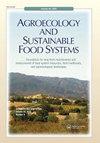害虫生物防治对玉米生产的重要性:专家调查
IF 2.6
3区 农林科学
Q1 AGRICULTURE, MULTIDISCIPLINARY
引用次数: 0
摘要
玉米是世界上最重要的主粮作物;2019年产量为11.5亿吨。食草昆虫对玉米生产造成重大损害,因此,过去20年来全球农药使用量增加,造成严重的环境退化和对人类健康的负面影响。今天,有一种趋势是纳入对生物多样性和人类健康危害较小的更可持续的管理做法。其中一种做法是利用天敌,通过保护性生物防治或引入生物防治剂来控制害虫的数量。然而,这些做法在世界各地不同的种植系统和地区已经存在了几十年;关于更可持续的管理做法对玉米生产的影响的信息很少。我们进行了一项专家评估,以评估生物防治对全球玉米生产的重要性是否有任何总体趋势或共识。我们通过在线调查收集了来自28个不同国家的70位专家的信息。在接受调查的专家中,91%的专家同意,无论他们研究的玉米类型、最终收获目的地或作物用途或管理制度如何,生物防治对玉米生产都很重要。利用获得的信息,我们确定了与农民接触的几个机会,以便将生物防治作为实现农业可持续发展的工具。图形抽象本文章由计算机程序翻译,如有差异,请以英文原文为准。
The importance of insect pest biocontrol for maize production: an expert survey
ABSTRACT Maize is the most important staple crop in the world; 1.15 billion tons were produced in 2019. Insect herbivores cause significant damage for maize production, and as a result, global pesticide use has increased over the last 20 years causing severe environmental degradation and negative impacts on human health. Today, there is a trend toward including more sustainable management practices that are less harmful to biodiversity and human health. One such a practice is the use of natural enemies to regulate pest populations using conservation biocontrol or introduction of biocontrol agents. These practices have been in place for several decades in different cultivation systems and regions throughout the world, however; information about the effects of more sustainable management practices on maize production is scarce. We conducted an expert assessment to evaluate whether there are any general trends or consensus about the importance of biocontrol for maize production globally. We compiled information from 70 experts from 28 different countries using an online survey. Of those surveyed, 91% of experts agreed that biocontrol was important for maize production regardless the type of maize they study, the final harvest destination or crop use, or management regime. Using the information obtained, we identify several opportunities for engaging with farmers in order to use biocontrol as a tool toward agricultural sustainability. GRAPHICAL ABSTRACT
求助全文
通过发布文献求助,成功后即可免费获取论文全文。
去求助
来源期刊

Agroecology and Sustainable Food Systems
AGRICULTURE, MULTIDISCIPLINARY-GREEN & SUSTAINABLE SCIENCE & TECHNOLOGY
CiteScore
4.80
自引率
7.70%
发文量
73
期刊介绍:
Agroecology and Sustainable Food Systems is devoted to the rapidly emerging fields of agroecology and food system sustainability. By linking scientific inquiry and productive practice with transformative social action, agroecology provides a foundation for developing the alternative food systems of the future. The journal focuses on the changes that need to occur in the design and management of our food systems in order to balance natural resource use and environmental protection with the needs of production, economic viability, food security, and the social well-being of all people.
Agroecology and Sustainable Food Systems examines our current food systems from production to consumption, and the urgent need to transition to long-term sustainability. The journal promotes the study and application of agroecology for developing alternatives to the complex problems of resource depletion, environmental degradation, a narrowing of agrobiodiversity, continued world hunger, consolidation and industrialization of the food system, climate change, and the loss of farm land. The journal uses a food systems approach, and seeks experiences in agroecology that are on-farm, participatory, change-oriented, and backed by broad-based methodologies of sustainability analysis and evaluation.
 求助内容:
求助内容: 应助结果提醒方式:
应助结果提醒方式:


